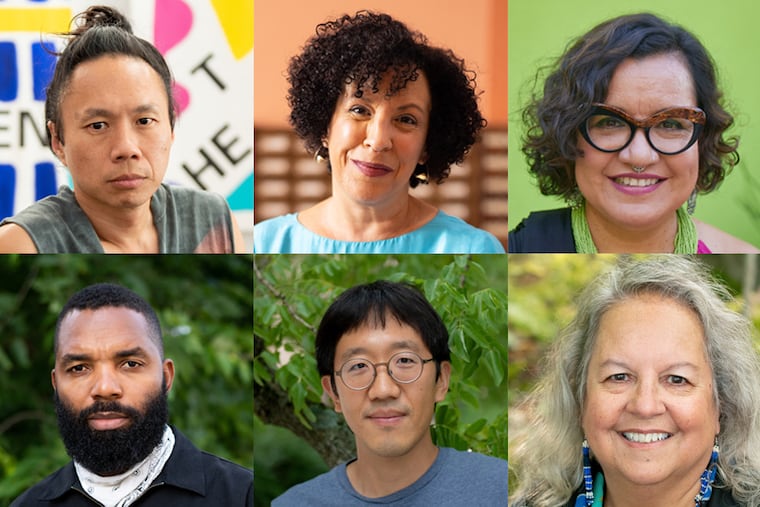This year’s ‘genius grant’ recipients include a Penn State historian and Princeton math professor
👋 Meet this year’s MacArthur Fellows.

A sociologist, an artist, a mathematician, a health justice lawyer, and 21 other trailblazers have been honored as the latest MacArthur Fellows. The annual prize is awarded by the MacArthur Foundation, a private group that aims to support creative endeavors and a “peaceful world,” according to its mission statement.
The group’s MacArthur Fellows Program — known unofficially as the “genius grant” — awards $800,000 over a five-year stretch to people who have “extraordinary originality and dedication in their creative pursuits and a marked capacity for self-direction.” The fellowship prides itself on its “no strings attached” approach, with the aim to invest in recipients’ potential.
The latest group of grant recipients — which was announced Wednesday — consists of 15 women and 10 men, including one professor from Pennsylvania and another from New Jersey.
Recipient P. Gabrielle Foreman, 58, is a historian and professor at Pennsylvania State University focusing on American literature and African American studies. Her work has highlighted Black organizing efforts throughout the 19th century through programs like the University of Delaware’s Colored Conventions Project, of which she is the founding director.
June Huh, 39, was also named a fellow in this year’s class. He’s a mathematician and a professor at Princeton University.
Here’s the full list of winners and their bios, provided by the MacArthur Foundation:
Jennifer Carlson
40, sociologist from Tucson, Ariz.
“Uncovering the motivations, assumptions, and social forces that drive gun ownership and shape gun culture in the United States.”
Paul Chan
49, artist from New York City
“Testing the capacity of art to make human experience available for critical reflection and to effect social change.”
Yejin Choi
45, University of Washington computer scientist from Seattle
“Using natural language processing to develop artificial intelligence systems that can understand language and make inferences about the world.”
P. Gabrielle Foreman
58, Pennsylvania State University literary historian and digital historian from University Park.
“Catalyzing inquiry into historic nineteenth-century collective Black organizing efforts through initiatives such as the Colored Conventions Project.”
Danna Freedman
41, Massachusetts Institute of Technology synthetic inorganic chemist from Cambridge, Mass.
“Creating novel molecular materials with unique properties directly relevant to quantum information technologies.”
Martha Gonzalez
50, Scripps College musician, scholar, and artist/activist from Claremont, Calif.
“Strengthening cross-border ties and advancing participatory methods of artistic knowledge production in the service of social justice.”
Sky Hopinka
38, Bard College artist and filmmaker from Annandale-on-Hudson, N.Y.
“Combining imagery and language in films and videos that offer new strategies of representation for the expression of Indigenous worldviews.”
June Huh
39, Princeton University mathematician from Princeton.
“Discovering underlying connections between disparate areas of mathematics and proving long-standing mathematical conjectures.”
Moriba Jah
51, University of Texas astrodynamicist from Austin, Texas
“Envisioning transparent and collaborative solutions for creating a circular space economy that improves oversight of Earth’s orbital spheres.”
Jenna Jambeck
48, University of Georgia environmental engineer from Athens, Ga.
“Investigating the scale and pathways of plastic pollution and galvanizing efforts to address plastic waste.”
Monica Kim
44, University of Wisconsin historian from Madison, Wis.
“Examining the interplay between U.S. foreign policy, military intervention, processes of decolonization, and individual rights in regional settings around the globe.”
Robin Wall Kimmerer
69, State University of New York plant ecologist, educator and writer from Syracuse, N.Y.
“Articulating an alternative vision of environmental stewardship informed by traditional ecological knowledge.”
Priti Krishtel
44, Initiative for Medicines, Access, and Knowledge health justice lawyer from Oakland, Calif.
“Exposing the inequities in the patent system to increase access to affordable, life-saving medications on a global scale.”
Joseph Drew Lanham
57, Clemson University ornithologist, naturalist, and writer from Clemson, S.C.
“Creating a new model of conservation that combines conservation science with personal, historical, and cultural narratives of nature.”
Kiese Laymon
48, Rice University writer from Houston
“Bearing witness to the myriad forms of violence that mark the Black experience in formally inventive fiction and nonfiction.”
Reuben Jonathan Miller
46, University of Chicago sociologist, criminologist, and social worker from Chicago
“Tracing the long-term consequences that incarceration and re-entry systems have on the lives of individuals and their families.
Ikue Mori
68, electronic music composer and performer from New York City
“Transforming the use of percussion in improvisation and expanding the boundaries of machine-based music.
Steven Prohira
35, University of Kansas physicist from Lawrence, Kan.
“Challenging conventional theories and engineering new tools to detect ultra-high energy sub-atomic particles that could hold clues to long-held mysteries of our universe.
Tomeka Reid
44, jazz cellist and composer from Chicago
“Forging a unique jazz sound that draws from a range of musical traditions and expanding the expressive possibilities of the cello in improvised music.”
Loretta J. Ross
69, Smith College reproductive justice and human rights advocate from Northampton, Mass.
“Shaping a visionary paradigm linking social justice, human rights, and reproductive justice.”
Steven Ruggles
67, University of Minnesota historical demographer from Minneapolis
“Setting new standards in quantitative historical research by building the world’s largest publicly available database of population statistics.”
Tavares Strachan
42, interdisciplinary conceptual artist from New York City and Nassau, Bahamas
“Expanding the possibilities for what art can be and illuminating overlooked contributions of marginalized figures throughout history.”
Emily Wang
47, Yale University School of Medicine primary care physician and researcher from New Haven, Conn.
“Partnering with people recently released from prison to address their needs and the ways that incarceration influences chronic health conditions.”
Amanda Williams
48, artist and architect from Chicago
“Reimagining public space to expose the complex ways that value, both cultural and economic, intersects with race in the built environment.”
Melanie Matchett Wood
41, Harvard University mathematician from Cambridge, Mass.
“Addressing foundational questions in number theory from the perspective of arithmetic statistics.”